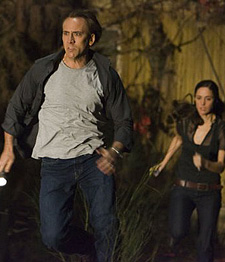 It has been a favourite question of evangelists for centuries - what would you do if you knew you were going to die tomorrow? Knowing asks what you would do if you knew the whole earth was coming to an end the same day.
It has been a favourite question of evangelists for centuries - what would you do if you knew you were going to die tomorrow? Knowing asks what you would do if you knew the whole earth was coming to an end the same day.
This science fiction thriller begins with the burying of a time capsule at an elementary school some time in the 1960's. Lucinda Embry, a girl troubled by whispering voices no-one else can hear, places a list of seemingly meaningless numbers into the container. Fifty years later it is unearthed and John Koestler (Nicholas Cage), a professor of physics, realizes the list comprises dates, co-ordinates and casualties of every major disaster for the past five decades - with a few dates still to come. However the focus of the film rests squarely on Koestler's son, Caleb, and his relationship with the final date and visions of an earthly apocalypse.
Knowing is so rich with themes that would benefit Christian conversations it is scarcely believable it emerged from a secular production house. At its core, though, it addresses the very human fascination with the future and what it holds. Cage's character enters the film believing that ".life is just a string of accidents and mistakes." He rails to his students against the deterministic idea that events are somehow proceeding along a pre-ordained path. This is not just his academic perspective; he has lost a wife to a tragic accident, and his son Caleb is now without a mother. To believe in a God that orders history would be to believe that her death was both known and approved.
However the discovery of the list changes everything. Koestler is unwillingly forced to conclude that not only were the tragedies that humanity had to deal with known well in advance, but that they formed part of someone's pre-ordained pattern. Furthermore, given that there are other tragedies coming, and a final apocalyptic moment, he is no longer simply free to muddle through his life. The predictions of the future are vouchsafed by the reliability of the past, written down and delivered into his hands. What better illustration of Biblical prophecy?
Knowing that your death is ordained is Knowing's central motivation. The key follow-on question is placed in the mouth of Lucinda Embry's now middle-aged daughter:
"What does it matter anyway . we all die."
Even Koestler wonders at the perversity of any supreme power that would place this apocalyptic information in his hands:
"Why do I get this prediction if there is nothing I can do about it? How am I supposed to stop the end of the world?"
But Koestler knows instinctively that he hasn't been given the information to that end. His goal is not to prevent the end of the world - that is already set in time, and the evidence of the past confirms it. No, his purpose is to seek the survival of himself and those who will listen. Naturally he is most concerned about his family. But as it turns out they are Christians and have no need of his warnings. Their eyes are already set on the world beyond this world. His father tells him that the day of his death holds no threat:
"I'm ready whenever the good Lord calls me - are you?
Knowing seems to offer much to the believer who has unbelieving friends who will sit through a film with them. Not everything is tailored made for a conversation about our eternal future. For example, Christians will certainly have things to critique about the end of the film. I won't be offering any spoilers here, but even amidst some dubious universalism there is a strong Biblical finish: many are called, but few are chosen.


























